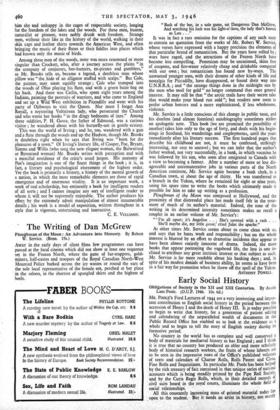The Writing of Dan McGrew
Ploughman of the Moon : An Adventure into Memory. By Robert W. Service. (Benn. 15s.)
AWAY in the early days of silent films few programmes can have passed at the local cinema which did not show at least one sequence set in the Frozen North, where the guns of fur-trappers, gold- miners, half-castes and troopers of the Royal Canadian North-West Mounted Police barked across the icy wastes or round the ears of the sole local representative of the female sex, perched at her place in the saloon, in the shortest of spangled skirts and the highest of heels.
" Back of the bar, in a solo game, sat Dangerous Dan McGrew, And watching his luck was his light-o'-love, the lady that's known as Lou . . ."
It was in fact a rare omission for the captions of any such story to contain no quotation from the works of Mr. Robert W. Service, whose verses have expressed with a happy precision the elements of that particular brand of romanticism. But the years have rolled by ; wars have raged, and the attractions of the Frozen North have become less compelling. Pemmican may be unrationed, skins free of coupons, and fire-water relatively cheap and drinkable compared with our own ; but romanticism has found new by-ways. The unwanted younger sons, with their dreams of other kinds of life and nostalgia for Piccadilly, have disappeared, or found their way into U.N.R.R.A. ; and "the strange things done in the midnight sun by the men who moil for gold" no longer command that once general interest. It may still be that " the arctic trails have their secret tales that would make your blood run cold "; but readers now seem to prefer urban horrors and a more sophisticated, if less wholesome, violence.
Mr. Service is a little conscious of this change in public taste, and his dateless (and almost formless) autobiography sometimes strikes an apologetic note. This book (we are promised the possibility of another) takes him only to the age of forty, and deals with his begin- nings in Scotland, his wanderings and employments, until the years immediately after his literary success. The first hundred pages that describe his childhood are not, it must be confessed, strikingly interesting, nor easy to unravel ; but we can infer that the author's father worked, not very successfully, in a bank, in which vocation he was followed by his son, who soon after emigrated to Canada with a view to becoming a farmer. After a number of more or less dis- agreeable and unremunerative jobs in various parts of the North American continent, Mr. Service again became a bank clerk, in a Canadian town, at about the age of thirty. He was transferred to a branch in the Yukon, where he remained for eight or nine years, using his spare time to write the books which ultimately made it possible for him to take up writing as a profession. Ploughman of the Moon was composed at Hollywood, and the proximity of that distressful place has made itself felt in the treat- ment of much of its author's material. Indeed, the tone of the writing in its determined intensity sometimes makes us recall a couplet in an earlier volume of Mr. Service's : " I'm all upset; it's Angeline . . . She's covered with a rash . . . She'll maybe die, my little gosse,' cried Julot the apache."
At other times Mr. Service seems about to come clean with us, and says that he hates work and responsibility ; but on the whole interest is blurred by an effort to dramatise incidents that appear to have been almost entirely innocent of drama. Indeed, the more books that appear portraying the vagabond life, the less is one in- clined to attribute any great intrinsic interest to that subject as such. Mr. Service is far more readable about his banking days ; and, in spite of his modest denials of business ability, he seems to have been in a fair way for promotion when he threw off the spell of the Yukon.
ArrrHortv POWELL.






























 Previous page
Previous page